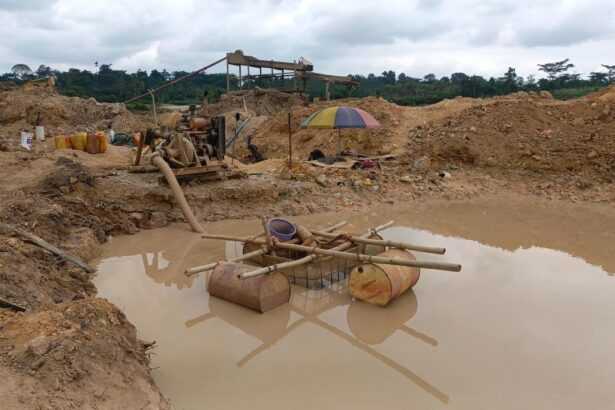The Politicisation issue of illegal small-scale mining (galamsey) has been heavily influenced by political interests, particularly during election periods, with allegations of official corruption and political affiliations shielding illegal miners. Retired security expert Col Festus Aboagye has asserted that corruption within regulatory bodies and law enforcement agencies, coupled with mismanagement of the small-scale mining sector and an uncontrolled licensing regime, has compromised the efficacy of government initiatives. Consequently, public trust in the government’s capacity to enforce laws has been undermined.
For instance, a 2023 report by Prof Frimpong Boateng alleged that numerous party officials at various levels were associated with illegal mining, often employing Chinese workers. Additionally, it claimed that appointees in the Jubilee House supported illegal mining, certain Members of Parliament and government appointees purportedly sold mining concessions for personal gain, and that traditional authorities and local officials were complicit in allowing illegal mining. The report highlighted that political interference and corruption had impeded efforts to combat illegal mining.
Another report in 2024 by “The Fourth Estate” revealed that several NPP politicians and officials had acquired mining licenses in forest reserves, leveraging the new L.I. 2462 (2022) that permits mining in previously protected areas, including the Oda River, Tano Nimiri, and Subri River Forest Reserves. The report suggested that the law was designed to benefit government associates with prior knowledge. Furthermore, the Ghana Mining Repository indicated 2093 active licenses in 2023 (up from 56 between 2009-2016), along with 12,779 applications in processing, in addition to an unknown number of illegal mining activities.
These reports underscore a substantial lack of transparency, potential conflicts of interest, absence of political will, commitment, candor, and, at times, complicity of officials. They illustrate a competition between political parties, significantly exacerbating the degradation of Ghana’s already threatened environment and forest reserves.
Colonel Festus Aboagye underscored the profound and multifaceted impact of illegal small-scale mining in Ghana on the economy, environment, and social fabric of communities. While acknowledging its immediate economic benefits and job opportunities, he emphasized the long-term consequences of environmental degradation, health risks, and social conflicts as significant challenges.
The management of small-scale mining and the fight against illegal mining in Ghana present intricate challenges demanding a comprehensive and sustained approach. Notwithstanding the government’s considerable efforts through legislation, periodic task forces, and community engagement, these endeavours have been compromised by corruption and deficits in political will.
Colonel Aboagye stressed the imperative of addressing the root causes of illegal mining, encompassing poverty, lack of alternative livelihoods, and weak governance, to advance sustainable practices in the mining sector. He advocated for a holistic approach integrating robust community involvement, economic development strategies, and rigorous enforcement of laws to effect enduring change.
He further advocated for the integration of illegal miners into the formal economy, the advocacy of responsible mining practices, and investment in alternative livelihood programs. Colonel Aboagye underscored the necessity of fortified institutional capacity, improved inter-agency collaboration, and enhanced stakeholder engagement. He emphasized the importance of striking a balance between economic opportunities, environmental conservation, and social equity to harness the potential of Ghana’s mineral wealth for sustainable development.
He concluded by asserting that the success of these efforts hinges on long-term commitment, adaptive policies, and collaborative endeavors from all stakeholders. He underscored that the success of these initiatives will not only safeguard the future of Ghana’s mining sector but also contribute to the overall well-being of its people and the preservation of its natural resources for generations to come.



